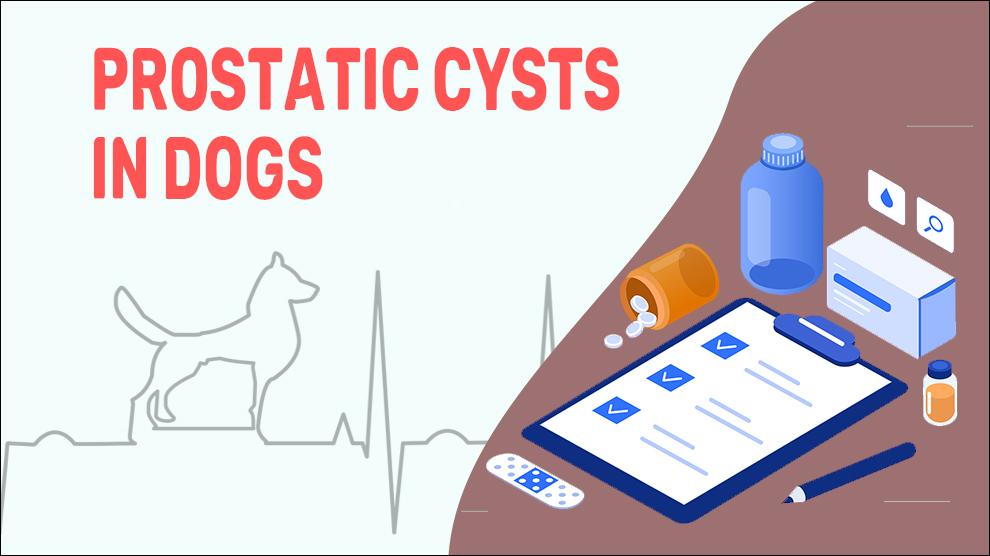Prostate is a chestnut-shaped, oval, mixed gland located in the pelvic cavity of adult dogs below the rectum and behind the bladder. This is called a mixed gland because it is formed by mucosal and serous components. The prostate gland is bilobed and through prostatic ducts, it discharges the contents to the urethra. The canine prostate gland is the only accessory male sex gland as it doesn’t have vesicular and bulbourethral glands.
Prostate cysts are benign, congenital fluid-filled or the solid mass of cells in the prostate gland of dogs. Usually, they are asymptomatic - cause no signs or symptoms, and don’t require any treatment.
However, occasionally they may be large enough to hamper the function of the Prostate or interfere with the prostate liquid flow or they can also be a part of underlying prostate diseases.
Typically prostate cysts are small, occasionally some may become large enough to cause pain, distension, or discomfort, then drainage or removal of the cysts may be required.
Symptoms Of Prostatic Cysts
- Hematuria (Blood in the urine)
- Abdominal distention (swelling)
- Stranguria/dysuria (Difficulty urinating )
- Urethral discharge
- Frequent attempts to urinate
- Constipation, obstipation, dyschezia, tenesmus
- Pain/General weakness
Treatment Options For Prostatic Cysts
Treatment is not necessary for most liver cysts. However, rarely cysts get large and cause discomfort or other symptoms, then they will be drained or surgically removed.
Surgery: When the cysts are large and symptomatic, smaller incisions will be made and the veterinarian will drain them using ultrasonic imaging.
Fenestration: This is a minimally invasive procedure quite similar to removing the top of a large blister. Using a laparoscopic (keyhole) approach, the surgeon removes the thin lining on the outside of the cyst and this will make the contents of the cyst drain. The left-behind cyst is then cauterized.
Home Remedies For Prostatic Cysts
Follow the instructions given to you by your veterinarian for the entire recommended time period. No matter how badly you want relief for your dogs or what you hear from other dog owners, talk with your vet before trying any home remedy.
Make sure to provide plenty of drinking water.
If any specific diet has been suggested to your dog, follow the diet very strictly, never provide or allow others to give your dog treats or other food.
Prevention Of Prostatic Cysts
Prostate Cysts etiology is poorly understood. Specific causes are not yet known. However, Hereditary is, perhaps a factor in some breeds and it is better to evaluate the affected dogs before breeding or at least before getting a dog from a susceptible lineage, and get the health checks done.
Affected Breeds Of Prostatic Cysts
Large Dog Breeds, Male Dogs, Young Dogs, Airedale Terrier, Beagle, Bouvier Des Flandres, Doberman Pinscher, German Shorthaired Pointer, Miniature Poodle, Norwegian Elkhound, Shetland Sheepdog, Scottish Terrier
Additional Facts For Prostatic Cysts
1. Causes:
- Congenital
- Benign prostatic enlargement
- Androgenic/ Estrogenic hormones
2. Types:
Prostatic cysts are of two types in dogs:
- Paraprostatic: Formed around/outside the gland
- Intraprostatic: Those formed inside the gland
3. Mortality:
There is no mortality documented because of prostate cysts
4. Diagnosis:
- Ultrasound
- MRI
- CT scan
- Blood tests to determine parasitic infection
5. Prognosis:
The prognosis for prostate cysts is really good. As the existing condition is not life-threatening, no rigorous treatment is usually necessary. However, relapse is possible following medical treatment in affected dogs. Proper hygiene and home care are the best defenses against future recurrences.
When To See A Vet
Contact your vet right away, if you notice any of the following:
- Prostate enlargement
- Stranguria/dysuria (Difficulty urinating )
- Hematuria (Blood in the urine)
Food Suggestions For Prostatic Cysts
- Commercial foods should have high-quality, natural ingredients, with no artificial additives.
- Nutrient-dense, vitamin-rich fruits and veggies
- High-fiber foods - whole grain bread, rice, green beans, peas
- Legumes, such as lentils, peas or beans
- Cauliflower, cabbage, broccoli, spinach, kale
- Tomatoes, citrus fruits, such as oranges and limes
- Avocadoes, blueberries, blackberries, raspberries
Conclusion
As most prostate cysts for affected dogs are incidental and benign, they do not require treatment or monitoring over time. The Prognosis is also excellent. Some cysts are large and hamper liver function or block the prostate flow, they are warranted for long-term monitoring.

















